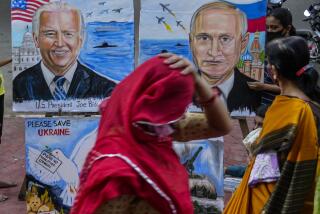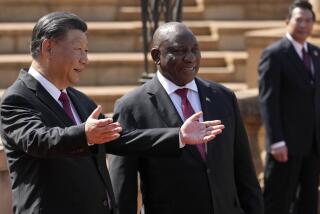Chance for Indian, Pakistani Leaders to Meet Is Scuttled
- Share via
KATMANDU, Nepal — A longshot opportunity to get the leaders of India and Pakistan talking again appeared to slip away Friday after the opening of a regional summit here was postponed because Pakistani President Gen. Pervez Musharraf arrived late.
The delay in the summit’s start until today meant that a private retreat, where Musharraf and Indian Prime Minister Atal Behari Vajpayee were supposed to mingle with five other leaders at a Himalayan resort, would likely be canceled, the Nepalese hosts said.
Observers had viewed the retreat as a prime opportunity for a face-to-face meeting about the tensions that have been mounting since a Dec. 13 terrorist attack on the Indian Parliament.
Musharraf and Vajpayee attended a dinner with other South Asian leaders Friday night, and the two men are staying at the same hotel. But India insists that the regional summit is not the place for such talks, despite pressure from the United States and other foreign governments.
Fog was the official reason for Musharraf’s failure to arrive in time for the summit’s scheduled opening Friday afternoon. He flew in from China, where he stopped to speak with leaders of Pakistan’s biggest ally in the region.
As India’s Foreign Ministry repeated that Musharraf had to do more to stop “cross-border terrorism,” Pakistani police Friday announced the detention about 130 extremists in overnight raids, which authorities said would continue.
Most of the people picked up were said to be suspects in domestic militancy. But some detainees were reportedly members of Jaish-e-Mohammed and Lashkar-e-Taiba, the two Pakistan-based groups that India says were behind the assault on Parliament in which 14 people died, including the five gunmen.
Pakistan has put the leaders of the two groups under house arrest, but so far they are accused only of making inflammatory speeches.
The Indian government insists that isn’t strong enough action. It has demanded that Pakistan hand over 20 alleged terrorists and criminals, including Jaish-e-Mohammed leader Maulana Masood Azhar. He fled to Pakistan after his release from an Indian jail in a deal to free passengers of an Indian Airlines flight hijacked to Kandahar, Afghanistan, in December 1999.
Friday’s diplomatic setback in Nepal came amid continued fighting between India and Pakistan along their border, and across the cease-fire line that divides Kashmir, the mountainous region that both countries claim.
Musharraf’s chief spokesman, Maj. Gen. Rashid Qureshi, told reporters here Friday that the Pakistani president, who took power in a bloodless 1999 coup, wants to talk to Vajpayee.
“We feel that the Indian government needs to pull back,” Qureshi said. “If India violates Pakistan’s land, air or sea frontier, Pakistan will respond with all its might.”
Asked whether Chinese leaders had promised to support Pakistan if the crisis deepens, Qureshi replied that China “has said it will support Pakistan in all eventualities.”
Vajpayee has held bilateral talks with every leader present at the summit in Katmandu, Nepal’s capital, except Musharraf, leaving the impression that he was trying to freeze out the Pakistani president.
With no breakthrough expected here, the diplomatic focus is shifting to British Prime Minister Tony Blair, who plans to meet Musharraf and Vajpayee this weekend during separate stops on a South Asian tour.
Although Blair is not bringing a specific peace initiative, he is expected to urge both leaders to take steps to ease the tension and start talking again.
The visit to India will be the first in eight years by a British prime minister. India was a British colony until 1947, when the subcontinent was granted independence and Pakistan was created to answer Muslim demands for a separate state.
More than 140 million Muslims live in India, which has about as many Muslim citizens as Pakistan. The two countries have fought three wars since independence, two of them over Kashmir.
The Himalayan region remains the biggest irritant between them, and many Indians are still bitter about Britain’s role in breaking up the country, so Blair must be careful not to push too hard in his discussions with Vajpayee.
The bloody 1947 partition, which forced hundreds of thousands of refugees to flee in both directions across the new border, left Kashmir in dispute. New Delhi says the former princely state’s ruler signed over control of the whole territory to India, while Pakistan insists that Kashmiris should be allowed to choose their allegiance in a referendum promised by the United Nations.
With war hanging in the balance, both India and Pakistan are trying to tilt the diplomatic balance permanently in their favor, and that complicates efforts to calm the crisis.
New Delhi has long insisted that Kashmir is an internal matter that must be solved in bilateral negotiations with Islamabad, while successive Pakistani governments have asked for third-party mediation to resolve the conflict.
Blair and Vajpayee plan to sign a joint declaration after their scheduled meeting in New Delhi on Sunday, an Indian official said without giving details. Blair then is to fly to Islamabad, the Pakistani capital, to meet with Musharraf.
More to Read
Sign up for Essential California
The most important California stories and recommendations in your inbox every morning.
You may occasionally receive promotional content from the Los Angeles Times.










